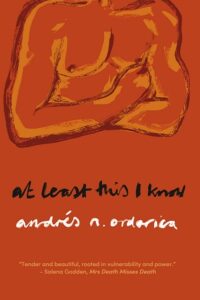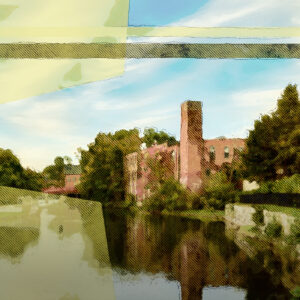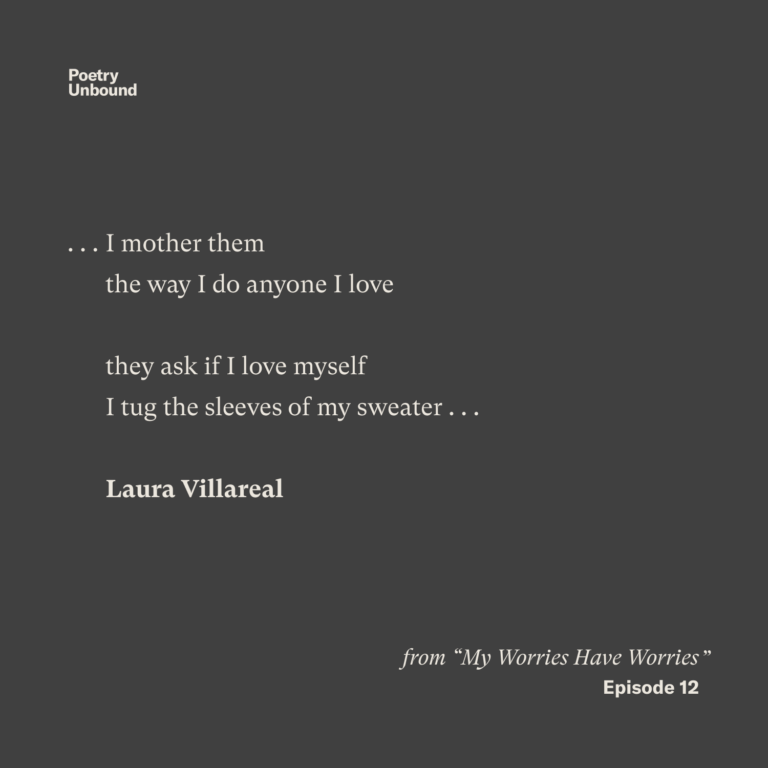Andrés N. Ordorica
Mis raíces
What is the landscape that has most influenced you? When do you go there? In person? Andrés N. Ordorica goes in dreams.
We’re pleased to offer Andrés N. Ordorica’s poem, and invite you to connect with Poetry Unbound throughout this season.
Pre-order the forthcoming book Poetry Unbound: 50 Poems to Open Your World and join us in our new conversational space on Substack.

Guest

Andrés N. Ordorica is a queer Latinx writer based in Edinburgh. His writing attempts to map the journey of his diasporic experience and unpack what it means to be from ni de aquí, ni de allá. His writing has been published widely and he regularly features at festivals around the UK. He is the recipient of a Second Life grant through the Edwin Morgan Trust. In 2021, his fiction manuscript was shortlisted for both the Morley Prize for Unpublished Writers of Colour and the Mo Siewcharran Prize. He is the author of the poetry collection, At Least This I Know. Image by: Daniel McGowan Photography.
Transcript
Pádraig Ó Tuama: My name is Pádraig Ó Tuama, and last year I was living away from Ireland for most of the time. And often enough, I would find myself with my eyes closed, remembering a particular walk that I love to take, a walk where there’s the smell of turf and peat, a walk where you can barely hear anything other than a stream and maybe a small bird. And I would go there in my mind, even when I was in the middle of a city. And there was something about carrying that piece of home with me in my memory that helped me feel from a place, even though I wasn’t there anymore.
[music: “Praise the Rain” by Gautam Srikishan]
“Mis raíces” by Andrés N. Ordorica.
“We are in the desert, lips cracked,
mouth dried like freshly milled maize.
“The ground sighs as if inconvenienced
by each of our steps over its thirsty ochre.
“There are tall green nopales lined in neat rows,
reminding me how even here abundance is possible.
“Grandfather asks me my thoughts of the land,
so, I ask him if this is where we come from:
“Sí mijo, half of you is from this desert.
“I lick my lips, parched like the earth,
take my boots off then my dirty socks.
“Stomp my feet to the beat of the Jarabe Tapatío,
digging deeper into the soil with each kick.
““What are you doing?” asks my grandfather.
“I want to be a nopal, Papá. I want to grow.
“So, he leaves me, then returns with a shovel,
carefully plants me into this weathered landscape.
“Afterward, he kisses me goodbye with such strength,
before patting my soft head, and in his touch, I know:
“I will be fine here. All will be fine.
“The desert is mine if I want it, here I’ll learn how to grow.
“And so, my grandfather begins the return journey alone,
the ground calls after him, but I stay quiet because I
know:
“I will be fine here. All will be fine.
“I am the true vine, and the desert is my gardener,
it’s mine to inherit because I am of both land and root.”
[music: “Daybreak” by Gautam Srikishan]
So this poem takes place in the desert, and I always feel, too, that this poem takes place in a dream. This is a poem about something that is deep and shared in family. The clue is in the title, “Mis raíces”: my roots.
Here we have the poet, Andrés N. Ordorica, and his grandfather, Papá as he calls him in conversation in the poem. And there’s this question about where am I from? Is this who I am? What does it mean to be from here? Am I here alone? Will you always be here? If you’re not, will I lose it? All of these questions of identity, locatedness, and a deep spiritual connection to land that has been in your family are present in this extraordinary poem.
Andrés N. Ordorica is a queer Latinx poet who now lives in Scotland and many of the poems in the book in which this poem is, are set in Scotland. Scottish friends, Scottish landscape, Scottish spouse. And he describes all of this with great vivacity, with great challenge, with great insight. And then at the end of the book, this is the last poem, a poem of the landscape that he carries with him. And so “Sí mijo, half of you is from this desert” is an extraordinary line.
Identity’s a complicated thing. We carry so many identities. There are some people who can say, “oh yeah, all my family are from here,” but there are many people who say, ‘”yeah, half of me’s from here, quarter of me’s from there, part of me’s from here.”
What we see in this poem is that this is the place that the poet is connected to. And he doesn’t live there. He has to carry it with him. In this way, I see the whole poem as a deep reminder about what it means to carry yourself with you. What it means for you to be you nurtured by the places that you, as well as your ancestors have come from. The landscapes, the dryness, the growth, the beauty, the searching for water, the searching for nurture. All of that DNA that’s passed down into you through memory and through hope and through practice in place, all of that is coming through in this poem.
[music: “Into the Earth” by Gautam Srikishan]
So much of this poem is a dialogue between the two main characters in it, you know, the speaker and the grandfather. But other things that are happening in the poem, too, is a profound sense of feet on the ground. He stomps his “feet to the beat of the Jarabe Tapatío”. He is doing a Mexican national dance. And this is a, a courtship dance, which had been banned by religious and colonial authorities at one point. It’s almost like he’s trying to bury himself at the start. And then the grandfather says, ““What are you doing?”” And he who is dancing wants to be a nopal, a nurturing plant that you can find in the desert. It can be used to eat. It can be used in healing. It’s a way of looking at this supreme abundance that you find in the desert. And his way of doing that is by using the body, by dancing, by letting the feet touch the earth from where he’s from. And therefore his grandfather buries him in order to grow.
The first time I read this poem, I initially was thinking it was describing an actual occurrence until then he was being buried in the desert by his grandfather. And we see the move to magic realism in it. And when that occurred, it made me go back to the beginning of the poem, wondering is this whole thing, a dream sequence or a mixture of something that happened, and then some mystical imagination that comes along with it. And in all art magic realism is there to highlight what isn’t magic. And what we see when he asks to be planted in the ground is that his grandfather kisses him goodbye with such strength and pats his head. There’s a memory of touch that’s happening there. And “(a)ll will be fine” here. Where is the here? Is it in the desert? Or is it in Scotland? If this is a dream, what is it saying to him living and married all the way in Scotland across the Atlantic? It’s saying that wherever he is, his land is with him because it is in him.
[music: “The House You Wake In” by Gautam Srikishan]
There’s nurture the whole way throughout this poem and sustenance, you know. There’s dry lips at the start and this sense of the ground sighing and the “thirsty ochre” of the ground. And in the midst of the fear of dryness, the fear of “will I survive here?” Then he begins to see the tall green nopales that are reminding him that abundance is possible here. And then he wants to be a nopal. He wants to grow. He also wants to be a place of nurture. For who? Himself probably, and perhaps everybody around him. And then he’s planted like a tree himself, another living, breathing thing.
The last couplet of the poem begins with a riff on something from the Christian Bible. “I am the true vine and the desert is my gardener.” That’s how Andrés N. Ordorica says it. In the Christian scriptures, Jesus of Nazareth says that he is the true vine and that God is the gardener. And I love what Andrés N. Ordorica does here. “I am the true vine and the desert is my gardener.” Taking something in the literary tradition and changing it and saying that for him, carrying this desert in him is like a belief, perhaps, in a God, and it is a belief in something that holds him steady, tells him who he is, tells him part of where he’s from and that he can bring wherever he is. “(I)t’s mine to inherit”, he says, “because I am of both land and root.” The last line picks up the title, “Mis raíces”, my roots.
There’s abundance happening in this poem, which I think speaks to an immigrant experience. In the notes at the back of the book, he honors his grandparents, all of whom were migrants. And here he is now a migrant himself across the Atlantic.
And I think when you’re a migrant, you can have a concern about “what is my relationship to my home place? Have I left it behind? How can I be nurtured in that?” And this extraordinary poem is a spiritual declaration to him that the abundance of the desert will not dry up for him.
[music: “The Consulate” by Blue Dot Sessions]
“Mis raíces” by Andrés N. Ordorica.
“We are in the desert, lips cracked,
mouth dried like freshly milled maize.
“The ground sighs as if inconvenienced
by each of our steps over its thirsty ochre.
“There are tall green nopales lined in neat rows,
reminding me how even here abundance is possible.
“Grandfather asks me my thoughts of the land,
so, I ask him if this is where we come from:
“Sí mijo, half of you is from this desert.
“I lick my lips, parched like the earth,
take my boots off then my dirty socks.
“Stomp my feet to the beat of the Jarabe Tapatío,
digging deeper into the soil with each kick.
““What are you doing?” asks my grandfather.
“I want to be a nopal, Papá. I want to grow.
“So, he leaves me, then returns with a shovel,
carefully plants me into this weathered landscape.
“Afterward, he kisses me goodbye with such strength,
before patting my soft head, and in his touch, I know:
“I will be fine here. All will be fine.
“The desert is mine if I want it, here I’ll learn how to grow.
“And so, my grandfather begins the return journey alone,
the ground calls after him, but I stay quiet because I
know:
“I will be fine here. All will be fine.
“I am the true vine, and the desert is my gardener,
it’s mine to inherit because I am of both land and root.”
[music: “Praise the Rain” by Gautam Srikishan]
Chris Heagle: “Mis raíces” comes from Andrés N. Ordorica’s book At Least This I Know. Thank you to 404 Ink, who gave us permission to use Andrés’s poem. Read it on our website at onbeing.org.
[music: “Praise the Rain” by Gautam Srikishan]
Poetry Unbound is: Gautam Srikishan, Eddie Gonzalez, Lilian Vo, Lucas Johnson, Amy Chatelaine, Kayla Edwards, and me, Chris Heagle.
Our music is composed and provided by Gautam Srikishan and Blue Dot Sessions.
This podcast is produced by On Being Studios, which is located on Dakota land. Open your world to poetry with us by subscribing to our Substack newsletter at poetryunbound.org. You may also enjoy our other podcast On Being with Krista Tippett, or our newsletter, The Pause. Visit us at onbeing.org to find out more.
[music: “Praise the Rain” by Gautam Srikishan]
Pádraig Ó Tuama: Friends, thanks very much for listening to Poetry Unbound, whether you’re new or you’ve listened to them all — your attention makes everything worthwhile. And I’ve got some news: I’ve written a book, Poetry Unbound: 50 Poems to Open Your World. There’s 50 poems, each with a fresh essay written by me. I’d love if you’d pre-order it, or pre-order a few, and join up to our free interactive newsletter. Links to everything at poetryunbound.org.
Books & Music
Recommended Reading
The On Being Project is an affiliate partner of Bookshop.org and Amazon.com. Any earnings we receive through these affiliate partnerships go into directly supporting The On Being Project.








